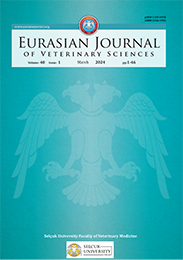| 2014, Cilt 30, Sayı 1, Sayfa(lar) 044-047 |
| [ Türkçe Özet ] [ PDF ] [ Benzer Makaleler ] |
| Cerebellar cortical abiotrophy in a Samoyed dog |
| Mehdi Saberi1, Reza Kheirandish2, Shahrzad Azizi2, Elham Mohebbi3 |
| 1Department of Clinical Sciences, Faculty of Veterinary Medicine, Shahid Bahonar University of Kerman, Iran 2Department of Pathology, Faculty of Veterinary Medicine, Shahid Bahonar University of Kerman, Iran 3Modeling in Health Research Center (MHRC), Kerman University of Medical Sciences, Kerman, Iran |
| Keywords: Samoyed, cerebellar abiotrophy, granular cells, Purkinje cells |
| Downloaded:1501 - Viewed: 2481 |
|
Cerebellar abiotrophies have a non-sex-linked, autosomal,
recessively inherited basis in anumber of animal species,
and lesions typically reflect progressive loss of Purkinje cells.
In this report, ataxia was observed in a one-week-old male
Samoyed puppy with no history of trauma or any other illness.
Physical examination revealed uncoordinated movements,
mild trunkal ataxia and intensive head tremors, so
the dog had trouble eating, evacuating and difficulties in
standing and walking without falling. The complete cell
count, cerebrospinal fluid analysis and cerebral radiographs
were normal. Treatment with diazepam, vitamin B1 and glucocorticoids
had no effect on clinical signs and the dog died
after a month. According to clinical signs and histopathological
features, cerebellar cortical abiotrophy was diagnosed.
This is the first report of a cerebellar cortical abiotrophy in a
Samoyed puppy.
|
| [ Türkçe Özet ] [ PDF ] [ Benzer Makaleler ] |




